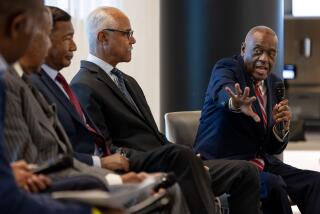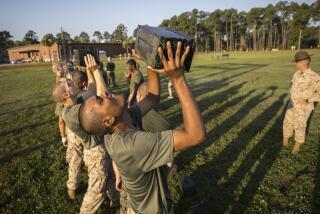The Marines: Always Faithful to Their History
- Share via
CAMP GRIZZLY, Kuwait — Marine Lance Cpl. William Figlesthaler of Naples, Fla., is a member of the Old Breed. He’s 19.
Figlesthaler and other members of the Camp Pendleton-based 1st Marine Division, the oldest, largest and most decorated division in the Marine Corps, are poised in dozens of locations in the Kuwaiti desert eagerly awaiting the order to “kick in the door” to Iraq.
Twelve years ago, the division, a.k.a. the Old Breed, was the first coalition force to fight through the Iraqi army encirclement of Kuwait City. The Iraqi line soon collapsed and the ground war came to a quick end.
Although he was only 7 when the Persian Gulf War happened, Figlesthaler grew up fascinated by stories in the media and from his friends’ older brothers about the Marines, past and present. It’s what attracted him to the corps rather than the Army, Navy or Air Force.
“The Marines have got the best history,” he said. “Now I’ve got a chance to carry on that tradition -- it’s awesome.”
While each branch of the military teaches its recruits about its history and heroes, none does so as thoroughly as the Marine Corps.
The emphasis on history starts with recruiting, which stresses the legacy of the corps. In boot camp, drill instructors deliver history lessons; in the final physical challenge, a 72-hour outdoor ordeal called “the crucible,” recruits are ordered to discuss the heroism of Medal of Honor recipients.
Officers and senior enlisted members pick up the task once new Marines report to their first duty stations.
The result is that the Marines may outpace any institution in America -- military or civilian -- in teaching its history to its members.
Chief Warrant Officer John Johnson, 40, of Detroit occasionally has young Marines assigned to his command read the commendations detailing the bravery of Marines awarded the Medal of Honor.
“I want them to understand the organization that they’ve joined,” he said. “There is something special about remembering those who preceded you.”
Last weekend, even as Camp Pendleton was consumed with preparing Marines and their gear to deploy to Kuwait, the base held a memorial service and banquet to honor the 58th anniversary of the amphibious assault at Iwo Jima by the 3rd, 4th and 5th Marine divisions.
“It’s one of the differences between us and the Army,” said 2nd Lt. Richard Wilkerson, 27, of Knoxville, Tenn. “Ask someone in the Army when the Army’s birthday is, and you’ll get a strange look. Ask any Marines about the birthday and they’ll tell you: ‘Nov. 10, 1775.’ ”
It was on that date that the Continental Congress, meeting in Philadelphia, ordered that “two battalions of Marines be raised” to serve as landing forces with the Navy. In a phrase that would serve as an advertising slogan two centuries later, the congress declared that “a few good men” be recruited.
With fewer forces and less heavy artillery than the Army, the Marine Corps prides itself on moving and striking quickly, seizing territory and establishing a beachhead for the forces arriving later.
As they wait for the order to go north for “trigger time,” Marines in Kuwait spend off-hours reading books about their history. The corps has an official reading list, with different books recommended for different ranks. At the top of the list are “the commandant’s favorites.”
Wilkerson is reading “With the Old Breed” by E.B. Sledge, the story of Marines at Peleliu and Okinawa.
Richard H. Kohn, military history professor at the University of North Carolina at Chapel Hill, said the Marines attract young men and women who want both a physical challenge and to “define their identity with what has become almost a legendary institution in American life.”
All of the services, Kohn said, seem to “produce a special elan, attitude and belief.” But the Marine Corps, he said, “because of its history and training seems to articulate and exhibit [it] more noticeably than the other services.”
The Marine force arrayed in the desert here includes veterans who served during the liberation of Kuwait in 1991 and recruits a few months out of high school. Almost uniformly, the younger members say they are eager to see if they measure up to the heroes they’ve read about.
“Most of them have not been scared yet by combat,” said Maj. Gen. Jan Huly, top general at the Marines Corps recruit depot in San Diego. “They’re 20 feet tall and invincible. That’s why the company commanders have to keep telling them to wear their flak jackets, helmets and gas masks. Most of them are itching to go out and fight someone.”
Part of the Marines’ fidelity to their history is a kind of enlightened self-interest. As the smallest of the services, the Marines live with an institutional insecurity, a fear that unless the public keeps being reminded of what the Marines have done for America, some politician will decide to fold the corps into the Army.
Comments allegedly made by President Truman, a World War I Army veteran, about disbanding the Marines are repeated as if they were made yesterday. “President Truman didn’t like us,” said one Marine here.
On the other hand, Marines delight in telling how Marine Gen. Holland “Howling Mad” Smith, put in charge of all U.S. ground forces at a decisive World War II battle, immediately fired the top Army general.
If their history makes the Marines feel special, it may also give some the feeling of being a group apart, even estranged, from the American public they serve.
“In civilian life, we’d be castaways,” said Sgt. David Anderson, 30, of Hammond, La. “But in the Marine Corps, we all click and come together. We’re a brotherhood, just like the history books say.”


